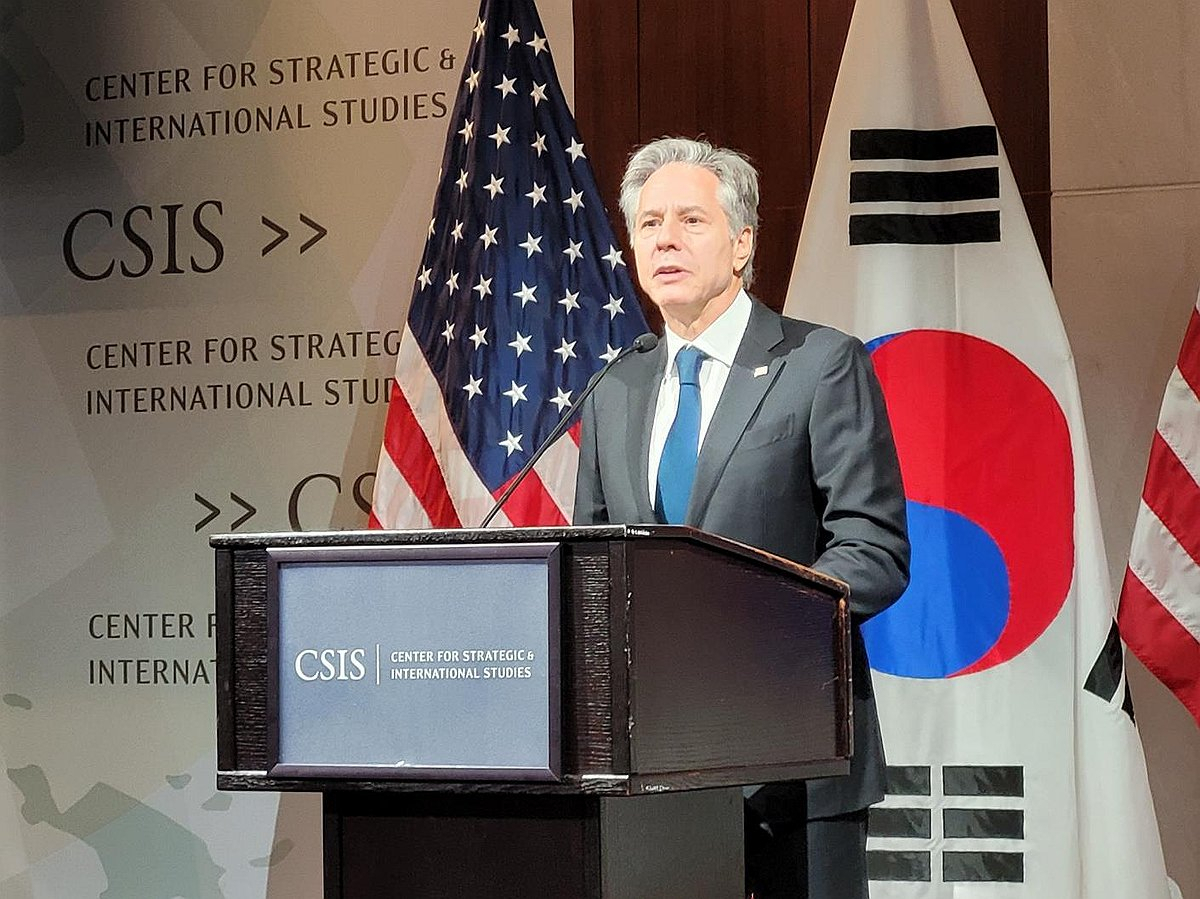 |
US Secretary of State Antony Blinken speaks during a forum, co-hosted by the Center for Strategic and International Studies and the Korea Foundation, in Washington on Monday. (Yonhap) |
US Secretary of State Antony Blinken said Monday military cooperation between North Korea and Russia undermines global peace, highlighting America's "ironclad" security commitment to South Korea.
Blinken made the remarks amid concerns that a rare summit between North Korean leader Kim Jong-un and Russian President Vladimir Putin earlier this month might have led to an arms deal that observers fear could help strengthen Pyongyang's military capabilities and support Moscow's war operations in Ukraine.
"Beyond the (missile) launches themselves, the DPRK threats to broader security were demonstrated clearly by Kim Jong-un's visit to Moscow this month," Blinken said during a forum on the South Korea-US alliance co-hosted by the Center for Strategic and International Studies and the Korea Foundation.
DPRK stands for North Korea's official name, the Democratic People's Republic of Korea.
"The DPRK is looking for help to strengthen and advance its own missile programs, working hand in hand with other partners and allies to highlight the dangerous ways Russia and North Korea's military cooperation threatens global peace and security," the secretary added.
Casting the recent development in ties between Moscow and Pyongyang as a "two-way" street, Blinken said Russia is "desperate" to find equipment and supplies for its ongoing war in Ukraine.
The summit between Kim and Putin has reinforced speculation that Pyongyang seeks military technology cooperation from Moscow to build spy satellites and other weapons systems, while Moscow wants more ammunition supplies from the North for use in the war in Ukraine.
The prospect of deeper military cooperation between the North and Russia has given rise to worries that it could further undermine security on the Korean Peninsula and flout U.N. Security Council resolutions.
Noting the alliance's oft-repeated slogan of "We go together," Blinken stressed Washington's defense commitment to Seoul.
"That commitment to mutual defense is ironclad," he said. "That starts with extended deterrence, particularly in the face of the DPRK's provocative actions, including its missile launches, which as everyone here knows, violate multiple UNSC resolutions and undermine stability on the peninsula and beyond."
Extended deterrence refers to the US' commitment to mobilizing all of its military capabilities, including nuclear weapons, to defend its East Asian ally.
The forum was held to discuss the 70th anniversary of the signing of the mutual defense treaty between South Korea and the United States on Oct. 1, and the alliance's future in the next seven decades.
Blinken assessed that the allies have been strengthening "all aspects" of their partnership, including security, trade and economic dimensions.
"In just a few days, we will celebrate 70 years since our country signed a mutual defense treaty ... 70 years of a relationship that has grown from a key security alliance into a vital global partnership -- one that's broadening in scope and significance seemingly every day," he said.
The secretary also took stock of enhanced trilateral cooperation with Japan as he touched on what he called a "historic" Camp David summit between President Yoon Suk Yeol and his US and Japanese counterparts, Joe Biden and Fumio Kishida, last month.
"It really did mark the start of a new era and trilateral cooperation among our countries," he said.
On the North Korean nuclear front, the three countries agreed at the summit on practical ways to improve joint responses through real-time North Korean missile warning data, trilateral defense exercises and efforts to counter the North's "malicious" cyber activity that funds its weapons programs, Blinken said.
In a separate speech at the forum, South Korea's Foreign Minister Park Jin called for a stop to any attempts to assist North Korea's "unlawful" weapons programs or engage in any arms trade with the recalcitrant regime.
"We sternly warn that these actions not only flagrantly violate multiple resolutions, but also endanger Korea's security," Park said in a video message.
He also said that permanent UNSC members, including Russia and China, have a "heavier" duty to abide by UNSC resolutions, while noting "all forms of arms trade and related cooperation" with Pyongyang is in "direct" breach of the resolutions.
In addition, Park accused the North Korean regime of "squandering" scarce resources on advancing its nuclear and missile programs.
"The multimillion and tens of million dollars diverted to every missile launch should have been spent on improving the lives of his own starving people," he said. "North Korea's actions are irrational, irresponsible and immoral." (Yonhap)







![[Weekender] Korea's traditional sauce culture gains global recognition](http://res.heraldm.com/phpwas/restmb_idxmake.php?idx=644&simg=/content/image/2024/11/21/20241121050153_0.jpg)